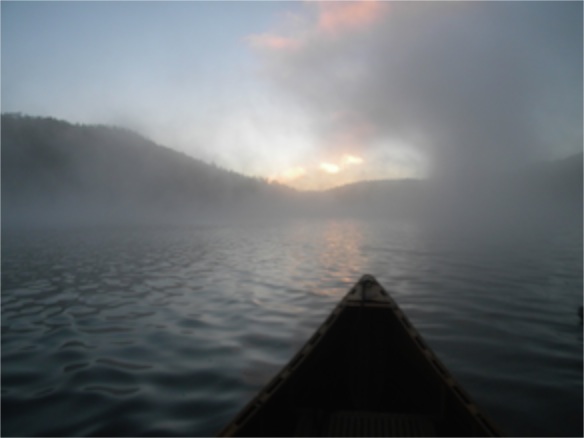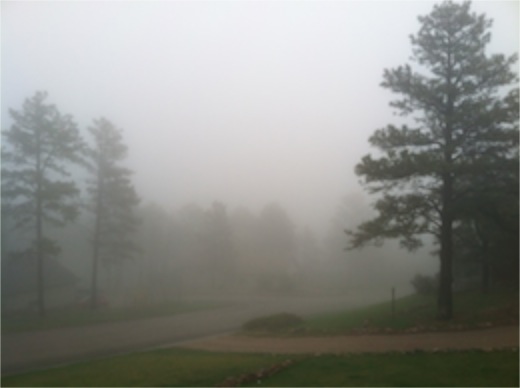In the fog
13/03/14 04:54
But I know that there are limits to my capacities in the fog. The pace of a canoe or kayak is just right for maneuvering in the fog. I don’t like to drive in the fog. Even at reduced speeds, there are just too many things that might be lurking in the fog. One drives with a heightened tension and is continually aware that the next surprise might be a bad one. An animal might be lurking on the road. Another driver might be going slow or even stopped. One has to be very careful and the process of driving in the fog always results in being more tense than one would otherwise be. I am no fan of flying an airplane in fog. In a three-dimensional environment one can become quickly disoriented. I’ve only had vertigo in a simulator, but I know how quickly one can lose an accurate perception of up and down and how dangerous this can be when flying on instruments. Pilots do it safely every day, but I have never developed a sense of comfort flying in the midst of a cloud.
Operating in the fog is a matter of pace, I think. I’m OK with a little fog in a canoe on a familiar lake. But I wouldn’t be happy beyond the sight of the shore on Lake Superior in the fog. I wouldn’t be comfortable out on the Puget Sound and lost in the soup.
I and sure that there are differences in personal tolerance for operating in the fog. An old salt might be quite comfortable out in the fog in the midst of a great lake or on the ocean. A very experienced pilot has no problem flying through a cloud with modern equipment and reliable radar. My tolerance is much lower.

I enjoy a glass of wine with a meal from time to time. I’ll drink a beer on a hot summer day. But I don’t like the feeling of being drunk. I suspect that I have a pretty low tolerance for alcohol simply because I could never keep up with the rate that some of my friends drink. And I don’t hang out with drunks. When I have had a bit too much I have resolved to never do that again. And I’m pretty good at keeping that resolution. I don’t like it when my thinking is foggy.
It may be a bit like paddling. A little fog at a slow speed has a certain charm. Too much fog and too much speed simply induce fear. And I’ve never been one who enjoys being afraid.
So I was alarmed to find myself in a fog yesterday. I’m still not sure what was going on. I tried to rule out some of the obvious possibilities: low blood sugar, high or low blood pressure, dehydration. I don’t think that any of those things was going on. My body was probably reacting to some virus or bacterial infection, and fortunately the results were short-lived, but there was definitely something that was just not right about me yesterday. I was having trouble focusing on the tasks I needed to accomplish. I was having trouble remembering things that I normally keep in my mind. And I kept wondering if I was making any sense to those with whom I was talking. Since I couldn’t remember what I had said, I wondered whether or not I had been talking nonsense to my colleagues and members of the congregation.
I spent most of the day, including several meetings, wandering in a bit of a fog.
It was not a pleasant experience.

When my mind is foggy, I develop fears about what it might mean. What if the fog never lifts? I have a tendency to panic.
Without my mind - without my ability to remember things, I wonder if I would be able to do my job. My preaching style is based on my ability to remember. My work with people is surrounded by my ability to remember. If I were to have to rely on my written notes from a meeting, I would never know what had occurred.
And I don’t know if you have ever experienced it, but trying to force yourself to remember makes it worse. By 8 a.m. yesterday, I couldn’t remember the focus of my blog. I re-read it repeatedly to remind myself and then I would forget it. I began to worry that what I had written was gibberish or nonsense because it definitely wasn’t memorable for me.
Maybe I should make an appointment with a psychiatrist. Maybe I am losing it.

Today feels a bit like I feel after having made a drive in the fog. I made it without a disaster. But I didn’t like the feeling and I hope I don’t have to head into that fog again anytime soon.